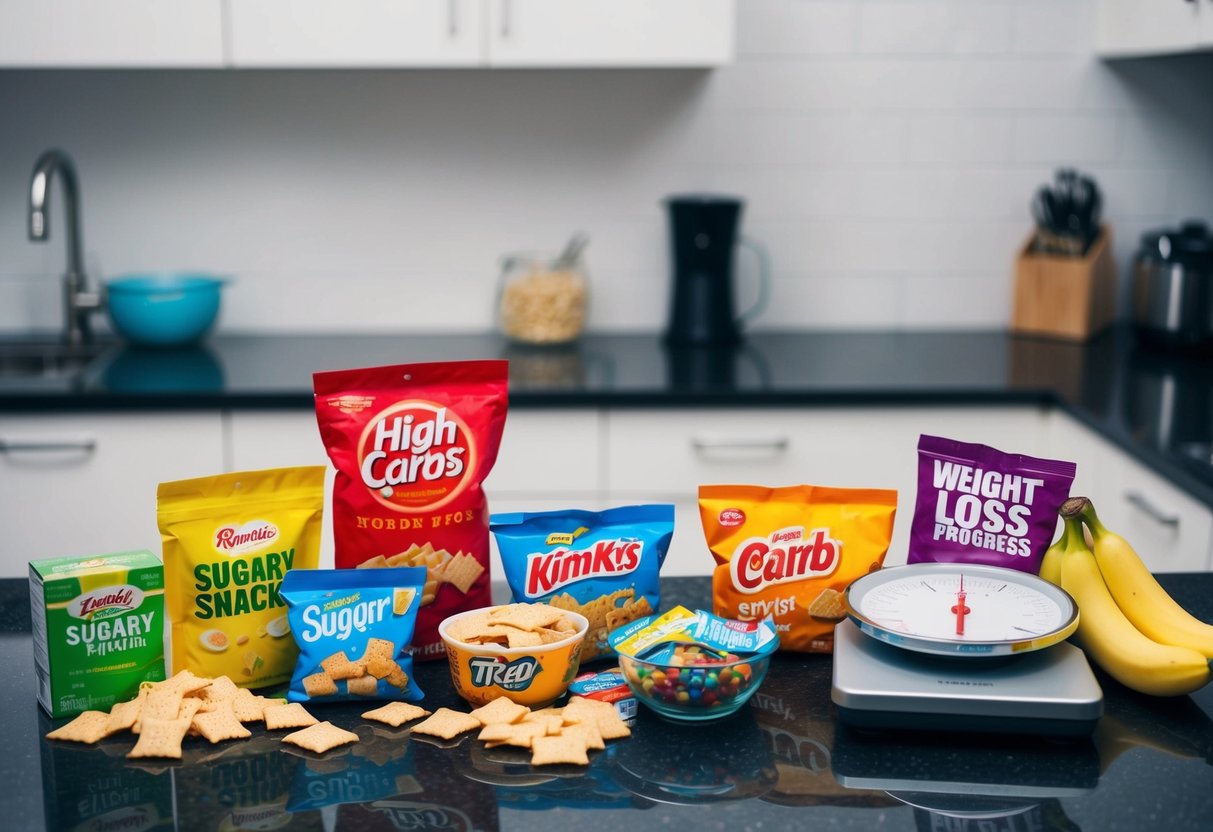Why Am I Not Losing Weight on Keto? Tips to Overcome Common Mistakes
Embarking on a keto diet with the expectation of steady fat loss is common—until the scale refuses to move.
If you are not losing weight on keto, the problem is rarely “willpower” or the diet itself. In most cases, stalled results come from a small set of hidden, correctable execution errors that quietly block progress.

This guide focuses on the real reasons keto weight loss stalls and the practical adjustments that help restore momentum—before people wrongly assume keto has failed them.
Key Takeaways
- Recognize and adjust keto mistakes to restart weight loss.
- Simple lifestyle changes can enhance keto effectiveness.
- Understanding ketosis is key to sustainable weight loss.
Understanding the Keto Diet and Ketosis

The ketogenic diet, commonly called keto, involves significantly reducing carbohydrate intake while increasing fats. This shift aims to push the body into ketosis, where it uses fat as its primary fuel source instead of carbohydrates.
The Role of Macros in Ketogenic Weight Loss
Macros, or macronutrients, are critical in maintaining ketosis and promoting weight loss on a keto diet. The primary focus is on fats, proteins, and carbohydrates.
A standard keto diet typically consists of about 70% fats, 20% proteins, and 10% carbohydrates.
This high-fat, low-carb ratio encourages the body to enter ketosis, shifting from burning glucose to burning fat.
Proteins are essential but should be consumed in moderation to prevent the conversion of protein into glucose through gluconeogenesis, which can hinder ketosis.
Monitoring caloric intake is necessary since consuming too many calories, even from fats, may stall weight loss.
If weight loss stalls persist, reviewing a step-by-step macro calculation guide can help identify subtle intake issues.
Net Carbs and Their Impact on Ketosis
Net carbs are calculated by subtracting fiber and certain sugar alcohols from the total carbohydrates. Understanding net carbs is crucial for maintaining ketosis.
Keeping net carbs low, typically under 20-50 grams per day, ensures that the body stays in ketosis.
Fiber’s role in this calculation is important, as it doesn’t significantly affect blood sugar levels.
Knowing the difference between total and net carbs aids in making informed food choices while preventing unintentional disruptions to ketosis.
Tracking net carb intake helps to avoid common pitfalls and supports sustained ketogenic success.
For beginners who want a simpler foundation, a keto beginner guide that explains the basics clearly can help eliminate early mistakes.
Fundamentals of Weight Loss on Keto

For effective weight loss on the ketogenic diet, understanding key nutritional elements is crucial. Establishing a calorie deficit combined with appropriate macronutrient balance is essential.
Calorie Deficit: The Undeniable Principle
A calorie deficit is the cornerstone of weight loss. Regardless of diet, weight loss occurs when caloric expenditure exceeds caloric intake.
On keto, focus on monitoring calorie consumption to ensure that fewer calories are consumed than are burned.
While keto can naturally reduce hunger, overconsumption of high-calorie foods like nuts and cheese may negate the deficit.
Maintaining a daily calorie log can help track intake.
It’s important to determine personal caloric needs based on factors like age, gender, and activity level. With these insights, a sustainable calorie deficit can be maintained.
Roles of Protein and Healthy Fats in Keto
Protein and healthy fats play substantial roles in the keto diet.
Adequate protein intake supports muscle maintenance and satiety without overconsuming calories.
Incorporating lean proteins like chicken or fish ensures that protein needs are met without excessive fats.
Healthy fats, though vital for energy on keto, should be consumed judiciously.
While avocados, olive oil, and fatty fish are beneficial, portion control is necessary to prevent consuming too many calories.
Balancing protein and fats optimizes ketosis and facilitates weight loss while preventing common pitfalls such as excess caloric intake.
Prioritizing these macronutrients ensures metabolism functions optimally while supporting body composition goals.
Top Keto Mistakes That Stop Weight Loss & How to Fix Them

Achieving successful weight loss on a keto diet can be challenging when common execution mistakes go unnoticed. Hidden carbs, imbalanced macronutrients, and early adaptation symptoms often create the illusion that keto “isn’t working,” when in reality, the issue is usually how the diet is being applied rather than the diet itself.
Many people unknowingly repeat the same errors week after week, assuming the solution is more willpower or stricter rules, while the real blockers remain unaddressed.
Identifying and Avoiding Hidden Carbs
Hidden carbs can sneak into meals and snacks, impeding progress.
Foods like sauces, dressings, and processed items may contain sugars or starches. It’s crucial to read labels and track everything consumed.
Opting for whole foods helps control carb intake more effectively.
Substituting with low-carb alternatives can also aid in maintaining the desired carbohydrate limit.
Food tracking apps or a simple food diary can be beneficial tools to ensure transparency about daily consumption.
Learning to recognize hidden carb sources that quietly stall keto results is often the fastest way to restart fat loss.
Adjusting Macronutrient Intake for a Weight Loss Plateau
Plateaus can occur when macronutrient ratios are not optimized.
While on keto, a typical distribution may involve about 70% fats, 20% protein, and 10% carbs. If weight loss stalls, reassess these ratios.
Muscle mass plays a role in metabolic rate, so adequate protein intake supports muscle maintenance.
Experimenting with slightly reduced fat intake could help the body tap into stored fat for energy.
Consulting nutritional advice tailored to personal needs can refine these adjustments.
Coping with Keto Flu and Carb Cravings
Keto flu can cause symptoms such as fatigue, headaches, and irritability. These often occur during the initial adaptation phase as the body switches fuel sources.
Increasing water and electrolyte intake can alleviate these symptoms and help adjust.
Cravings and appetite changes are common as the body adapts to low carb intake.
Finding low-carb snack options, like nuts or cheese, helps manage cravings.
Regular meal planning can prevent impulsive eating and ensure balanced nutrition.
Staying committed to the keto lifestyle aids in overcoming initial discomfort for long-term success.
Mitigating External Factors That Affect Weight Loss

External influences like alcohol consumption and potential medical conditions can play a significant role in weight loss challenges. Addressing these factors can help individuals progress more effectively on their weight loss journey.
Learning how to break a weight loss stall on keto often requires changes beyond food alone.
Managing the Impact of Alcohol and Social Eating
Alcohol can be a significant barrier to weight loss. It not only adds empty calories but can also lower inhibitions, leading to overeating or choosing less healthy foods during social events.
Choosing to limit alcohol intake can help considerably.
Individuals might consider opting for lower-calorie options such as light beer or dry wine.
Social eating often presents challenges with excessive calorie consumption, as well.
Creating a plan, such as eating a healthy small meal before attending events, can reduce hunger and cravings, improving food choices in social settings.
When to Consider a Medical Condition
Sometimes, weight loss plateaus are due to underlying medical conditions such as insulin resistance or hypothyroidism. These conditions can affect metabolism and make weight loss more difficult.
It is vital for individuals to consult with healthcare professionals if they suspect such issues.
Medical assessments and tests can identify conditions that may contribute to obesity or hinder weight management.
Stress, another factor, can trigger a hormonal response that impacts weight loss.
Managing stress through techniques such as meditation or exercise may help alleviate its effects on the body.
Identifying and managing these factors can thus enhance the effectiveness of keto or any weight loss strategy.
The Impact of Lifestyle Factors on Keto Success

Success on a keto diet is influenced by various lifestyle factors, beyond just food choices. Exercise habits, sleep quality, and stress management are crucial components. Each plays a significant role in determining how effectively one can lose weight on keto.
Exercise and Physical Activity: Finding the Right Balance
Physical activity is essential for maximizing the benefits of a ketogenic diet.
While it’s easy to assume that more exercise is always better, balance is key.
High-intensity workouts might initially seem beneficial but can potentially spike stress hormones like cortisol.
Incorporating a mix of activities, such as cardiovascular exercises, strength training, and low-impact workouts like yoga, helps.
Regular physical activity not only boosts metabolism but also enhances the body’s ability to utilize fats for fuel.
Tailoring an exercise routine to match personal fitness levels and energy availability is vital. Rest days are equally important to allow recovery and prevent injuries.
The Effect of Sleep Quality on Weight Loss
Quality sleep plays an underrated but significant role in weight loss while on a keto diet.
Sleep deprivation can lead to an imbalance of hunger hormones like ghrelin and leptin, increasing appetite and cravings.
Aiming for 7-9 hours of uninterrupted sleep nightly supports effective weight management.
Sleep also influences insulin sensitivity and stress hormone levels, which can affect fat storage and energy utilization.
Prioritizing good sleep hygiene practices, such as maintaining a regular sleep schedule and creating a restful environment, is beneficial.
Reducing evening screen time and caffeine intake can improve sleep quality further.
How Chronic Stress Can Stall Progress
Chronic stress can significantly hinder weight loss efforts on keto by altering hormonal balances.
When the body is under stress, it releases cortisol, a hormone that can promote fat storage, especially around the abdominal area.
Stress affects dietary choices, often leading to comfort eating or increased consumption of high-calorie foods.
Developing stress management techniques, such as meditation, mindfulness, or hobbies, is crucial.
These activities help lower cortisol levels, allowing the body to better respond to dietary changes on the keto plan.
Additionally, maintaining social connections and seeking support can provide emotional relief, further enhancing the diet’s effectiveness.
This pattern is exactly why keto is not working for many people who rely only on surface-level rules
Frequently Asked Questions
Many people face challenges on the keto diet, even after achieving ketosis. Factors such as plateaus, calorie intake, and intermittent fasting can influence weight loss success.
Why am I not losing weight despite being in ketosis?
While ketosis is crucial, it doesn’t guarantee weight loss.
Overeating healthy fats or not tracking food intake can slow progress. Consuming hidden carbs or stress-related hormones too can impact weight loss.
Is it possible to be in ketosis and still not lose weight after two weeks?
Yes, individual metabolic responses vary.
Some people need more time for their bodies to adapt. Adjustments in diet or increased physical activity might accelerate results.
What could be the reason for not losing weight on keto by the fourth week?
Weight loss stalls can occur due to calorie overconsumption or lack of exercise.
Hormonal imbalances or underlying medical conditions might also be factors.
How can I overcome a weight loss plateau while following a ketogenic diet?
Adjusting macronutrient ratios or incorporating exercise can help break plateaus.
Tracking progress and being mindful of portion sizes ensures an effective approach.
Can one be in a calorie deficit, follow a ketogenic diet, and still not lose weight?
Yes, metabolic adaptation can contribute to this.
The body may burn fewer calories to conserve energy, making weight loss difficult despite a calorie deficit.
Can intermittent fasting help break a weight loss plateau?
Intermittent fasting can be beneficial. It may boost metabolism and increase fat burning.
This can aid in overcoming weight loss plateaus when combined with a keto diet.
Not losing weight on keto is rarely about a lack of effort. In most cases, progress stalls because small execution errors, hidden intake issues, or one-size-fits-all advice fail to match how your body actually responds.
Once those variables are identified and corrected, fat loss becomes far more consistent and predictable.
When troubleshooting stops working, a structured plan removes guesswork and execution errors.
